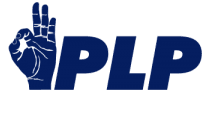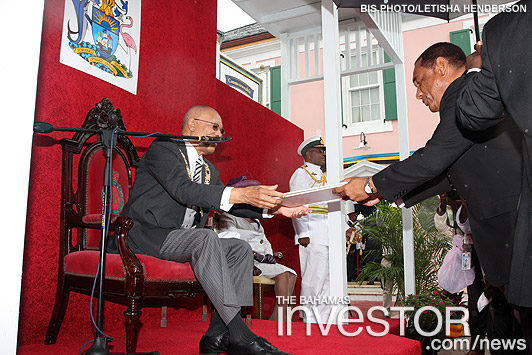| Source: Date: Updated: |
TheBahamasInvestor.com
Thursday, May 24, 2012 Thursday, May 24, 2012 |
 Governor General Sir Arthur Foulkes on Wednesday announced plans for the government to lower taxes on high-end real estate transactions, explore niche markets in tourism and enhance the air and sea transportation system.
Governor General Sir Arthur Foulkes on Wednesday announced plans for the government to lower taxes on high-end real estate transactions, explore niche markets in tourism and enhance the air and sea transportation system.
Although the Governor General delivers the annual speech at the opening of the new parliament, it is written by the government and has the Cabinet’s approval.
In an effort to stimulate the real estate market, Sir Arthur announced that the new Progressive Liberal Party government intends to make good on its commitment to lower the maximum rate of stamp duty on land sales from 12 to 10 per cent and will also reintroduce a maximum cap on real property tax.
Previously, the government stamp duty on property conveyance was 12 per cent on real estate valued over $250,000. Most local homeowners pay eight per cent stamp duty on property valued between $50,000.01–$100,000. In property sales the vendor and purchase each pay half of the stamp duty unless otherwise agreed.
With regards to real property tax, residential property owners paid no taxes on homes valued under $250,000. Homes between $250,000–$500,000 pay three quarters of a per cent on market value. Those in the $500,000–$1 million category pay one per cent and the tax is one quarter per cent on that part of market value greater than $5 million.
In lowering stamp duty and capping real property tax in the high-end real estate market, the government is hoping to attract more second-home owners to The Bahamas.
The move is part of wider review of the Bahamas tax structure.
Currently, much of the Bahamas government revenues comes from customs duties.
Previously, the International Monetary Fund (IMF) and Standard & Poor’s (S&P) have remarked on the country’s revenue vulnerability, which stems from a reliance on taxes from goods coming into the country.
“My government will launch an extensive review of the Bahamian tax system with a view to proposing alternative means of taxation that address the problems of the current system, while providing the government with a stable, buoyant and adequate source of revenue to meet its governance obligations to the people,” said Sir Arthur.
In regards to tourism, in order to revitalize the main driver of the nation’s economy, the government proposes to increase the number of available and affordable hotel rooms. The government also hopes to create opportunities for Bahamians to own hotels through a National Resort Development Initiative.
Meantime, promotional efforts will explore opportunities for tourism growth in niche markets including film, entertainment, sports, health and religious tourism, as well as medical, heritage and eco-tourism.
The cultivation of new markets in Asia and Latin Amercia is also expected to form a key part of the national tourism promotion plan.
In other tourism-related developments the government intends to collaborate with local and foreign air carriers to improve airlift to and throughout The Bahamas.
“In the area of transport, which is so vital to our archipelagic nation, my government will overhaul the existing air sector policy to create a safer and more efficient air transport system,” said Sir Arthur. “This will include the creation of a modern civil aviation regulatory regime, the creation of a fully independent body to investigate air accidents, enhanced communications technology and upgraded radar equipment.”
Additionally, the government said it plans to take steps to address the management of the Bahamas Flight Information Region (FIR), which will permit access to overflight fees on The Bahamas’ airspace.
In relation to maritime transport, Sir Arthur said the government will implement maritime safety standards, protocols and inspection regimes on all national ships and personnel, and adopt the Caribbean Ship Safety Code and Small Vessel Code.
tblair@dupuch.com











